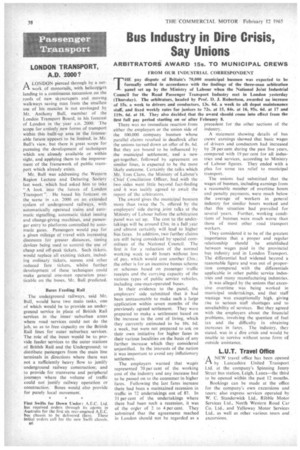Bus Industry in Dire Crisis, Say Unions
Page 40

If you've noticed an error in this article please click here to report it so we can fix it.
ARBITRATORS AWARD 15s. TO MUNICIPAL CREWS
FROM OUR INDUSTRIAL CORRESPONDENT
THE pay dispute of Britain's 70,006 municipal busmen was expected to he formally settled in accordance with the findings of the three-man arbitration panel set up by the Ministry of Labour when the National Joint Industrial Council for the Road Passenger Transport Industry met in London yesterday (Thursday). The arbitrators, headed by Prof. D. J. Robertson, awarded an increase of I5s. a week to drivers and conductors, 13s. 6d. a week to all depot maintenance staff, and fixed weekly rates for juniors to 72s. at 15, 84s. at 16, 95s. 6d. at 17 and 119s. 6d. at 18. They also decided, that the award should coolie into effect from the first full pay period starting on of after February 8.
There was no Immediate reaction from either the employers or the union side of the 100.000 company busmen whose parallel claims resulted in deadlock after the unions turned down an offer of 8s. 6d. But they are bound to be influenced by the municipal settlement, and a new get-together, followed by agreement on similar lines, is expected to be the most likely outcome. Certainly the talks which Mr. Tom Claw, the Ministry of Labour's Chief Conciliation Officer, had with the two sides went little beyond fact-finding and it was tacitly agreed to await the
report of the arbitrators. • • •
The award gives the municipal busmen more than twice the 7s. offered by the employers' side during joint talks at the Ministry of Labour before the arbitration panelwas set up. The cost to the undertakings will be around Dm. in a full year and almost certainly will lead to higher bus fares. In addition, two further claims are still being considered by special committees of the National Council. The first is for a reduction of the normal working week to 40 hours without loss of pay, which would cost another Om.; the other is for an incentive bonus scheme or schemes based on passenger traffic receipts and the carrying capacity of the various types of public service vehicles, including one-man-operated buses.
In their evidence to the panel, the employers' side submitted that it had been unreasonable to make such a large application within seven months of the previously agreed settlement. They were prepared to make a settlement based on The increase in the cost of living, which they currently estimated to be 10s. 6d. a week, but were not prepared to ask on their own initiative for higher fares in their various localities on the basis of any further increase which they considered unjustified. In the interests of the nation it was important to avoid any inflationary settlement.
The employers warned that wages represented 70 per cent of the working cost of the industry and any increase had to be passed on to the consumer in higher fares. Following the last fares increase there had been a maintained recession in traffic in 72 undertakings out of 87. In 31 per cent of the undertakings where there had been such a recession, it was of the miler of 2 to 4 per cent. They submitted that the agreements reached in London should not he regarded as a precedent for the other sections of the industry.
A statement showing details of bus crews' earnings showed that basic wages of drivers and conductors had increased by 28 per cent during the past five years, compared with 19 per cent for all industries and services, according to Ministry of Labour figures. They ended with a plea for some tax relief to municipal transport.
The unions had submitted that the wages of busmen, including earnings from a reasonable number of overtime hours and penalty payments, were much below the average of workers in general industry for similar hours worked and that this situation had prevailed for several years. Further, working conditions of busmen were much worse than those of most other road transport workers.
They considered it to be of the greatest importance that a proper and regular relationship should be established between wages paid in the provincial bus industry and in London Transport. The differential had widened beyond a reasonable figure and was out of proportion compared with the differentials applicable in other public service industries and many manufacturing industries.
It was alleged by the unions that excessive overtime was being worked in municipal undertakings, and that staff wastage was exceptionally high, giving rise to serious staff shortages and to unreliability of services. But they agreed with the employers about the financial problems, involving the question of fuel tax and the difficulty in obtaining increases in fares. The industry, they stated, was in a dire crisis and would be Unable to survive without some form of outside assistance,
L.U.T. Travel Office
ANEW travel office has been opened by Lancashire United Transport Ltd. at the company's Spinning Jenny Street bus station, Leigh, Lanes—the third to be opened within the past 12 months.
Bookings can be made at the office for the company's own excursions and tours: also express services operated by W. C. Standerwick Ltd., Ribble Motor Services Ltd., North Western Road Car Co. Ltd., and Yelloway Motor Services Ltd., as well as other various tours and excursions.






























































































































